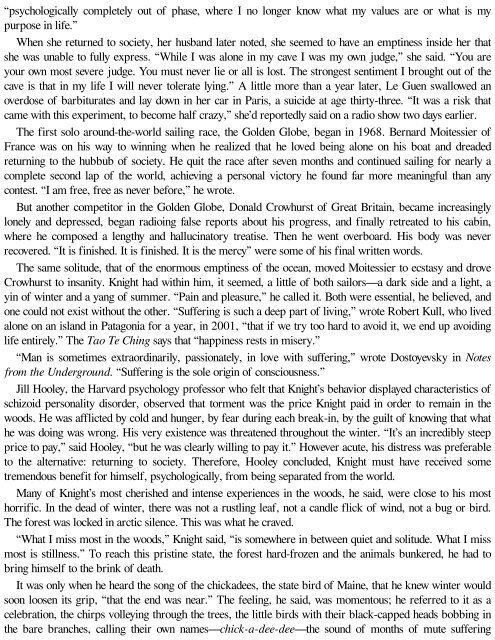You also want an ePaper? Increase the reach of your titles
YUMPU automatically turns print PDFs into web optimized ePapers that Google loves.
“psychologically completely out of phase, where I no longer know what my values are or what is my<br />
purpose <strong>in</strong> life.”<br />
When she returned to society, her husband later noted, she seemed to have an empt<strong>in</strong>ess <strong>in</strong>side her that<br />
she was unable to fully express. “While I was alone <strong>in</strong> my cave I was my own judge,” she said. “You are<br />
your own most severe judge. You must never lie or all is lost. <strong>The</strong> strongest sentiment I brought out of <strong>the</strong><br />
cave is that <strong>in</strong> my life I will never tolerate ly<strong>in</strong>g.” A little more than a year later, Le Guen swallowed an<br />
overdose of barbiturates and lay down <strong>in</strong> her car <strong>in</strong> Paris, a suicide at age thirty-three. “It was a risk that<br />
came with this experiment, to become half crazy,” she’d reportedly said on a radio show two days earlier.<br />
<strong>The</strong> first solo around-<strong>the</strong>-world sail<strong>in</strong>g race, <strong>the</strong> Golden Globe, began <strong>in</strong> 1968. Bernard Moitessier of<br />
France was on his way to w<strong>in</strong>n<strong>in</strong>g when he realized that he loved be<strong>in</strong>g alone on his boat and dreaded<br />
return<strong>in</strong>g to <strong>the</strong> hubbub of society. He quit <strong>the</strong> race after seven months and cont<strong>in</strong>ued sail<strong>in</strong>g for nearly a<br />
complete second lap of <strong>the</strong> world, achiev<strong>in</strong>g a personal victory he found far more mean<strong>in</strong>gful than any<br />
contest. “I am free, free as never before,” he wrote.<br />
But ano<strong>the</strong>r competitor <strong>in</strong> <strong>the</strong> Golden Globe, Donald Crowhurst of Great Brita<strong>in</strong>, became <strong>in</strong>creas<strong>in</strong>gly<br />
lonely and depressed, began radio<strong>in</strong>g false reports about his progress, and f<strong>in</strong>ally retreated to his cab<strong>in</strong>,<br />
where he composed a lengthy and halluc<strong>in</strong>atory treatise. <strong>The</strong>n he went overboard. His body was never<br />
recovered. “It is f<strong>in</strong>ished. It is f<strong>in</strong>ished. It is <strong>the</strong> mercy” were some of his f<strong>in</strong>al written words.<br />
<strong>The</strong> same solitude, that of <strong>the</strong> enormous empt<strong>in</strong>ess of <strong>the</strong> ocean, moved Moitessier to ecstasy and drove<br />
Crowhurst to <strong>in</strong>sanity. Knight had with<strong>in</strong> him, it seemed, a little of both sailors—a dark side and a light, a<br />
y<strong>in</strong> of w<strong>in</strong>ter and a yang of summer. “Pa<strong>in</strong> and pleasure,” he called it. Both were essential, he believed, and<br />
one could not exist without <strong>the</strong> o<strong>the</strong>r. “Suffer<strong>in</strong>g is such a deep part of liv<strong>in</strong>g,” wrote Robert Kull, who lived<br />
alone on an island <strong>in</strong> Patagonia for a year, <strong>in</strong> 2001, “that if we try too hard to avoid it, we end up avoid<strong>in</strong>g<br />
life entirely.” <strong>The</strong> Tao Te Ch<strong>in</strong>g says that “happ<strong>in</strong>ess rests <strong>in</strong> misery.”<br />
“Man is sometimes extraord<strong>in</strong>arily, passionately, <strong>in</strong> love with suffer<strong>in</strong>g,” wrote Dostoyevsky <strong>in</strong> Notes<br />
from <strong>the</strong> Underground. “Suffer<strong>in</strong>g is <strong>the</strong> sole orig<strong>in</strong> of consciousness.”<br />
Jill Hooley, <strong>the</strong> Harvard psychology professor who felt that Knight’s behavior displayed characteristics of<br />
schizoid personality disorder, observed that torment was <strong>the</strong> price Knight paid <strong>in</strong> order to rema<strong>in</strong> <strong>in</strong> <strong>the</strong><br />
woods. He was afflicted by cold and hunger, by fear dur<strong>in</strong>g each break-<strong>in</strong>, by <strong>the</strong> guilt of know<strong>in</strong>g that what<br />
he was do<strong>in</strong>g was wrong. His very existence was threatened throughout <strong>the</strong> w<strong>in</strong>ter. “It’s an <strong>in</strong>credibly steep<br />
price to pay,” said Hooley, “but he was clearly will<strong>in</strong>g to pay it.” However acute, his distress was preferable<br />
to <strong>the</strong> alternative: return<strong>in</strong>g to society. <strong>The</strong>refore, Hooley concluded, Knight must have received some<br />
tremendous benefit for himself, psychologically, from be<strong>in</strong>g separated from <strong>the</strong> world.<br />
Many of Knight’s most cherished and <strong>in</strong>tense experiences <strong>in</strong> <strong>the</strong> woods, he said, were close to his most<br />
horrific. In <strong>the</strong> dead of w<strong>in</strong>ter, <strong>the</strong>re was not a rustl<strong>in</strong>g leaf, not a candle flick of w<strong>in</strong>d, not a bug or bird.<br />
<strong>The</strong> forest was locked <strong>in</strong> arctic silence. This was what he craved.<br />
“What I miss most <strong>in</strong> <strong>the</strong> woods,” Knight said, “is somewhere <strong>in</strong> between quiet and solitude. What I miss<br />
most is stillness.” To reach this prist<strong>in</strong>e state, <strong>the</strong> forest hard-frozen and <strong>the</strong> animals bunkered, he had to<br />
br<strong>in</strong>g himself to <strong>the</strong> br<strong>in</strong>k of death.<br />
It was only when he heard <strong>the</strong> song of <strong>the</strong> chickadees, <strong>the</strong> state bird of Ma<strong>in</strong>e, that he knew w<strong>in</strong>ter would<br />
soon loosen its grip, “that <strong>the</strong> end was near.” <strong>The</strong> feel<strong>in</strong>g, he said, was momentous; he referred to it as a<br />
celebration, <strong>the</strong> chirps volley<strong>in</strong>g through <strong>the</strong> trees, <strong>the</strong> little birds with <strong>the</strong>ir black-capped heads bobb<strong>in</strong>g <strong>in</strong><br />
<strong>the</strong> bare branches, call<strong>in</strong>g <strong>the</strong>ir own names—chick-a-dee-dee—<strong>the</strong> sound of months of mute suffer<strong>in</strong>g
















